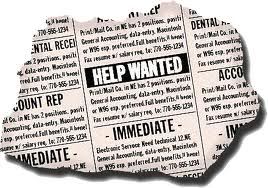Can’t Find the Right Pharmacist Hire? Check Your Job Description
 One of the biggest mistakes hiring managers & pharmacy directors make during the hiring process is writing a vague or incomplete job description. From the thousands of job descriptions I have seen, many are vague. Some job descriptions don’t even convey clearly whether it’s an inpatient or outpatient position. As a result, an HR/pharmacy department is flooded with a large percentage of unqualified candidates that waste their time.
One of the biggest mistakes hiring managers & pharmacy directors make during the hiring process is writing a vague or incomplete job description. From the thousands of job descriptions I have seen, many are vague. Some job descriptions don’t even convey clearly whether it’s an inpatient or outpatient position. As a result, an HR/pharmacy department is flooded with a large percentage of unqualified candidates that waste their time.
A well-written job description is key to attracting the right pharmacist candidates to you. This is a potential candidate’s first impression of what it is like to work at your facility.
Start with writing down values that are important to your pharmacy & facility. For example, “Strong work ethics” or “professional growth”. You will incorporate these values within the job description. Next, write down the purpose of the role. This helps both you get grounded about what to write in the job description, and conveys to a potential applicant how he/she would fit in to the rest of the organization.
 As you are writing this, set the intention to paint a strong picture of what it is like to work at your pharmacy. If you keep this in mind as you write the job description, it will be more powerful than a job description that just follows a typical job description format.
As you are writing this, set the intention to paint a strong picture of what it is like to work at your pharmacy. If you keep this in mind as you write the job description, it will be more powerful than a job description that just follows a typical job description format.
Next, start with the main responsibilities and key aspects that are important in the role. Main responsibilities could include reviewing patient records and labs, preparing IVs, and counseling patients. Key aspects could include teamwork, problem-solving skills, clinical skills, computer skills, and the attitude you want your pharmacist to have.
The size and pace of your pharmacy can be acknowledged. For example, you could mention that the pharmacy current fills on average 800-1000 Rxs/day. Mention any pharmacy-run clinical programs unique to your facility or on-the-job training unique to your facility. Be clear about the schedule expectations.
Describe the technical ability of the pharmacist you are looking for. Example: the ability to process prescriptions with the support of Script Pro Central. Experience with CPOE, McKesson, and bedside coding.
The clearer you are about your ideal candidate not just from the perspective of responsibilities, the more likely you will attract the right pharmacist. You may even wish to incorporate a separate paragraph in your job description describing your ideal candidate. The ideal candidate’s attitude, skills, experience level can be summarized in this paragraph titled “Ideal Pharmacist for this Position”. Phrases like the following can be used: “Self starter”, “Positive attitude”, “being a part of a high-functioning fast-paced environment”, or “handles miscommunication in a professional and direct manner.”
An effective job description also takes a paragraph to express what is unique about the facility. For example, if your pharmacy has been recognized by the hospital for an award, this is attractive to a potential new hire because it shows that the pharmacy focuses on excellence. Highlight strong management support and leadership, if you have it. Pharmacists like to work under a well-supported management.
A paragraph about this may look like “We are a facility recognized as one of the top 100 hospitals to work in the US. Services include….”
 Run your job description by the person in the current role or by someone else in your pharmacy. Ask them if it gives them a strong sense of what the responsibilities entail.
Run your job description by the person in the current role or by someone else in your pharmacy. Ask them if it gives them a strong sense of what the responsibilities entail.
You don’t need to reinvent the wheel. You can share job description ideas among other facilities that have similar roles, however, definitely add in the essence of what makes working at your facility unique.
When you work with a recruiting firm to find the right pharmacist to hire, use the recruiter to take your job description to life. An independent recruiter can paint a picture of what it’s like to work there to a candidate and serves as a walking & talking ambassador for your facility. Use this to your advantage. Although a recruiter can save you time by networking with pharmacists who fit your criteria, assessing a candidate’s honest answers about what he/she really wants in a job, and determining whether the position is a true fit, the important step of creating a well-written job description is not to be skipped. It can be highly supportive to a walking & talking ambassador for your facility. It will lead to finding the right pharmacist for your facility.
4 Secret Ways to Attract Good Pharmacists to Your Pharmacy (Part II)
It’s easier to attract a pharmacist who has worked at your pharmacy before as a pharmacy student or resident. You also have the benefit of having experienced the pharmacist’s capability and fit for the position.
SOLUTION: Attract pharmacists by developing an externship program or residency program, if you don’t have one already. Stay in touch with them–they may become your future hires.
Out of the Fire
Do you spend most of your time in the fire? Are you putting out fires or helping out in the pharmacy on the line, leaving little time for high-level visioning for the pharmacy? Or do you spend most of your time doing high-level visioning, but receive complaints from your pharmacy staff that you are disconnected and don’t understand the main challenges they experience? For those of you who have budget crunches, being on the line may seem like a complete necessity. It is also easy to feel a sense of accomplishment when you are out there on the line helping patients and making a difference.
This is a tricky balance to achieve when you face the dilemma of being in a budget crunch where you need to make the best use of your time. When you are caught up in the day-to-day operations of the pharmacy, it is hard to be in the space of taking a step back to take a high-level view and consider what is best for the short-term and long-term vision of the pharmacy.
However, as a leader, you will “spin” less if you take time to step back to think of the bigger picture. It will help you make a difference in many more patients. How can you impact 500 patients vs. you serving them 1-on-1? These are questions you play an important part in answering, as the leader of the pharmacy.
On the flip side, if you spend all of your time visioning, managing budgets, project management, patient satisfaction/quality improvement, as well as hiring/firing, you may lose the pulse of what is happening among your pharmacy staff and what is important to the patients. Regardless of what side of the coin you are on, there are things that you can do right away to make sure you focus on the bigger vision even if you’re busy.
Stay tuned for an article coming up about 4 steps you can take today to focus on the bigger vision, even if you are busy.
In the meantime, if you are a pharmacy manager or director, share below how frequently you are in the fire vs. stepping back to focus on the bigger vision and make plans. What has worked & hasn’t worked for you? What are some obstacles you have to reach a balance between working with your pharmacy staff vs. on your pharmacy?
?
Pharmacy Directors- Biggest Management Challenges?
Share your biggest management challenges being a pharmacy manager by commenting on this blog or click here. I will answer the most commonly asked questions here. Also, stay tuned for a multi-speaker pharmacist/pharmacy manager telesummit event within the next year that will address your main management challenges.
One of the most common challenges mentioned by pharmacists about their management is managing expectations and communicating expectations clearly.
One way to communicate expectations clearly is to conduct set performance reviews.
Here’s a pearl on having performance reviews that inspire your staff’s performance. Something you may not be doing currently: Include the pharmacist rating him/herself on measurable factors, in addition to you as the pharmacy management evaluating the pharmacist. Allow the pharmacist to participate in the creation of some of those measurable factors as well.
Stay tuned! I will write on other ways to communicate expectations effectively in another blog article.
“I Don’t Want to Spend Time Training”
This article is for Indian Health Service pharmacy directors only.
This is one of the most common comments pharmacy directors share with me, both for training new hires and relief pharmacists. A way to save you time to train is to hire slowly for the right hire and screen for pharmacists who have as many translatable skills as possible. If you have a relief pharmacist coming in, select someone with IHS experience. At the same time, there will always be new procedures and strategic direction unique only to your facility.
Training is an area that is easy to shortcut. The most common excuses are: “I don’t have time”, “Things are always changing around here; just ask other pharmacists how they will handle this.” Read more
How to Hire the Best Pharmacist, Not the Best Interviewer
Pharmacy directors & hiring managers, when have you hired someone on who did so well in an interview, but didn’t perform for you after the interview? “Hire slowly, fire fast” is a motto managers are often told. Here are 3 strategies to hire the best pharmacist for the position, rather than the best interviewer:
1. Check references thoroughly by asking insightful questions. This means checking all references consistently. Ask open-ended questions and situational questions, such as ones that delve deeper into what may not have gone well & how it was handled.
“Tell me about a time when [something didn’t go well]. How did he/she handle it?”
“What is [pharmacist]’s approach to handling conflict?”
“What advice do you have for someone who may be managing [pharmacist] in the future?”
Read on for the rest of this article & 2 other strategies to hire the right pharmacist. Read more
Misunderstood Expectations, to a Pharmacy Everyone Wants to Work For
One of the main reasons why pharmacists leave their jobs is because they have an unsupportive team environment. Pharmacy managers & HR managers, here is one solution to that:
Create a Code of Honor. Create a “code of honor” specifically for the pharmacy. This is something that isn’t talked about a lot, but is in essence the things (said or unsaid) that a team works according to. If there is not an established code of honor for the team, an individual usually goes by his/her own code of honor to make decisions. This is where you can start having problems. Read more on why it matters, what examples of a code of honor are, and how to create a team environment everyone wants to be a part of. Read more
I Hate Pulling Other People’s Weight
 Have you ever worked in a pharmacy where you felt like you had to pull other people’s weight? That other pharmacists didn’t have the same view as you regarding workflow?
Have you ever worked in a pharmacy where you felt like you had to pull other people’s weight? That other pharmacists didn’t have the same view as you regarding workflow?
I was just having a conversation with a pharmacist who is experiencing this: prescriptions piling up to be handed out while another pharmacist he works with seems to prioritize differently & may spend more time reviewing patient records than noticing that prescriptions are piling up to be handed out. And that this person doesn’t necessarily do it intentionally, but is perhaps one-track minded & unaware when he gets deep into reviewing patient records.
I have observed this myself while practicing in a pharmacy, noticing pharmacists have different viewpoints about what is acceptable workflow priority and speed. I have seen pharmacy staff become frustrated with each other at varying levels. It comes from the belief that a particular priority is the right one & in being upset that someone else isn’t matching up to how you feel priorities should lie.
With my experience in practice, this is a conclusion that I’ve come to–that just like a spouse or a family member, you have no control over what someone else perceives & chooses to do. What you do have control over is influencing someone. As a leader too, you also don’t ever really have control over anyone; you can inspire others to do as you request & there may be consequences to them perhaps not meeting your expectations, but no person can be controlled.
What you do have control over is stepping up & encourage others. You have the ability to use your leadership skills even if you are not the designated leader, by asking them to help you out where you feel the workflow priorities are, if they appear oblivious. Do the best that you can in your role and in your encouragement of others; then let go of the rest. Otherwise, it can only create frustration in you.
If it is to the point where you feel that another pharmacist’s workflow priorities are impacting your workflow substantially, approach your pharmacy director or direct manager and have a conversation about how they feel the workflow priorities are to be.
Pharmacy managers, consider setting clear cut workflow priorities that are both verbally expressed to the whole group and written, so it becomes a standard and there are no questions about what expectations are for everyone.
What is your advice when you’ve encountered this situation? What has worked or hasn’t worked for you?
4 Secret Ways to Attract Good Pharmacists to Your Pharmacy (Part I)
Don’t you wish that you could always be fully staffed and never have to worry about hiring pharmacists or getting pharmacist coverage when you need it?
There are more pharmacist candidates to choose from in this competitive pharmacist job market, but pharmacies are still telling me that it is taking time to find the right candidate. There are more candidates to sift through. In fact, many of you are holding out to hire just the right pharmacist because you want to make sure he/she is the right investment.
The scoop #1: Pharmacists are discouraged by the lack of fulfillment in their job.
SOLUTION: The more you are able to offer in your position a good mix between clinical/staff, the ability to be involved in non-routine work and offer a sense of contribution beyond simply dispensing, the easier time you will have attracting a good pharmacist.
Take an interest not only in the pharmacist’s professional & career development, but also offer the opportunity for personal growth. By doing so, you expand your pharmacist’s capacity to handle different situations and step into being the best pharmacist possible for your patients. This can involve teleseminar training, live event training, books, CDs on areas outside of pharmacy.
Share with your potential pharmacist hires how your company is different with encouraging personal growth & fulfillment in their jobs. This alone will make your company more attractive than others.
Comment below on this idea & what else has worked for your pharmacy to attract good pharmacists. Stay tuned in future blog posts for 3 other secret ways to attract good pharmacists for your pharmacy.